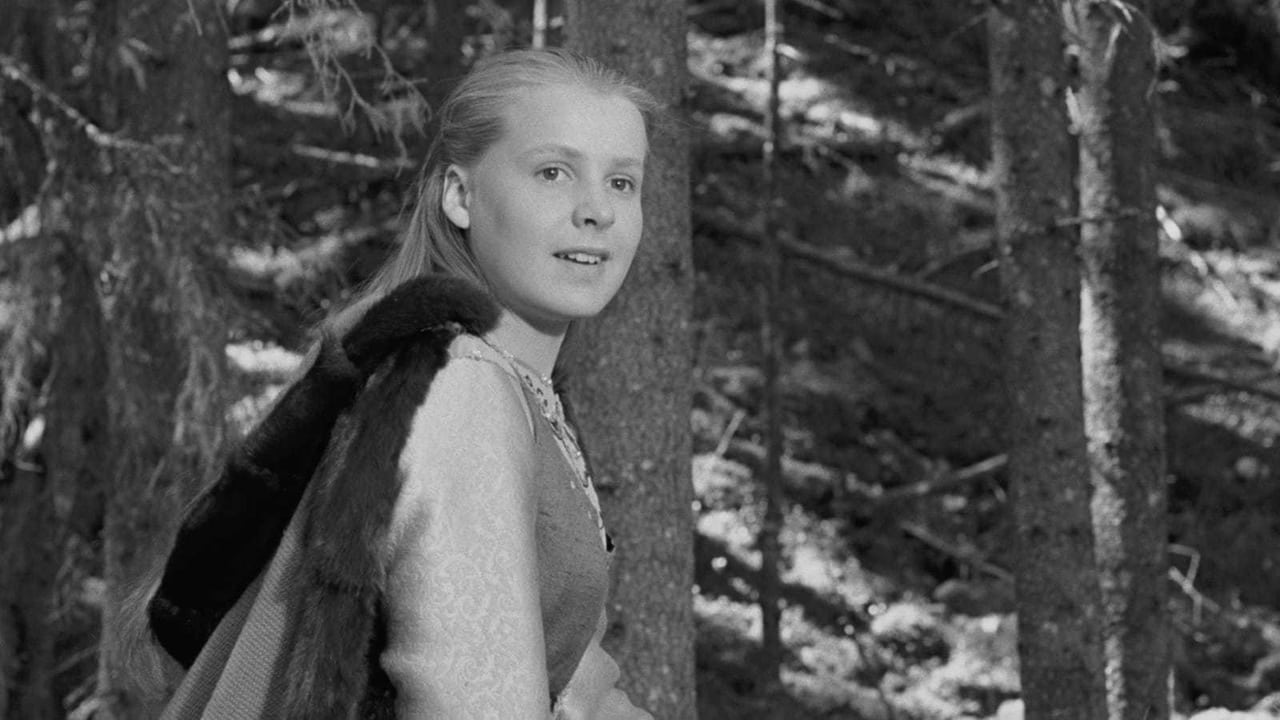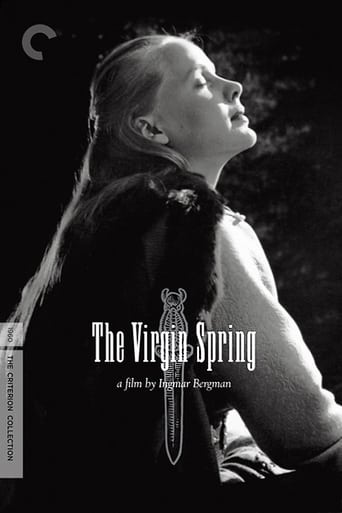



Strong and Moving!
everything you have heard about this movie is true.
View MoreLet me be very fair here, this is not the best movie in my opinion. But, this movie is fun, it has purpose and is very enjoyable to watch.
View MoreThere are moments that feel comical, some horrific, and some downright inspiring but the tonal shifts hardly matter as the end results come to a film that's perfect for this time.
View MoreYears ago when I first saw THE LAST HOUSE ON THE LEFT I'd read that it was loosely based on the 1960 Ingmar Bergman film THE VIRGIN SPRING. For one reason or another I'd never been able to see that movie though so just how loosely I never knew. That was one of the sad things about there being no video at one time and later that video stores didn't carry many films considered "art films" in small towns. So when I saw Criterion was releasing the film I was anxious to finely have the opportunity to see it.The movie features Max Von Sydow as Christian Per Töre, a landowner in medieval Sweden who has converted to Christianity with his wife Märeta (Birgitta Valberg). They have a young daughter named Karin who we see early on is indulged being the apple of her father's eye. Living in the same house is Ingeri (Gunnel Lindblom), a peasant serf of the family who resents them and has a reputation that has left her pregnant. With a holy day coming Karin is assigned the task of taking candles to the nearby church. Anxious to go she dresses in her finest clothes and asks that Ingeri accompany her. With hate in her eyes Ingeri goes along until they reach a stream before entering the nearby forest. Afraid for some reason she remains behind with the man who owns mill at the stream. When he attempts to assault her she runs after the long gone Karin.As she makes her way through the forest Karin comes across three herdsmen, brothers, and offers to share her lunch with them. They lead her to a field and as lunch progresses she senses danger from the three. Before she can escape them they're on her and rape her. When she tries to run afterward, one clubs her to death. As this all happens Ingeri watches from the wood, never helping. The men steal the fine clothes Karin was wearing and leave her behind in the woods. Back at the homestead Christian and his wife worry about their young daughter when she doesn't return, but not overly so. She's stayed in town before. As it grows dark the three herdsmen show at the house completely unaware that this is the home of Karin. They're invited in and provided a meal and shelter with the potential of work. During the night however Märeta finds her daughter's clothing among their things. Ingeri returns and tells them what happened. Events are set in motion from that point that will forever change them all.Most people will have already known the story of this film with it being over 50 years old now but I decided not to reveal the final portion of the film. That's difficult to do because some of the most striking images are contained there. If you watch the film on the Criterion edition you'll see what I mean and also hear in the extras some of the things I can't quite refer to here.The story is stark and brutal but there's no other way to depict what occurs. That this much was shown (though no real skin makes it to the screen) in 1960 is stunning in itself. But the brutal act of rape is on display and the murder after while quick is also heightened by the way the body is ransacked and left totally exposed to the world. It's upsetting and yet at the same time not nearly as much so as later films depicting the same act have been. LAST HOUSE that I referenced earlier or even the rape in DEATH WISH are much more upsetting. But the naïve attitude of Karin and her soft beauty make it an unbearable act in this film. What comes later at the hands of a grieving father is equally disturbing and yet done in such a manner as to truly be considered artistic.The movie in its entirety itself is gorgeous. Cinematographer Sven Nykvist did an amazing job with the stark black and white photography shown here. This was the first film he did with Bergman and they collaborated on many more after. The clarity of the Criterion version here is amazing. As an example a scene early on of Ingeri that's backlit shows the fine strands of stray hair completely visible in the picture. And being shot in black and white actually helps the movie rather than hinder it. To be honest this is the first film by Bergman I've had the opportunity to watch. The only reason I can explain for that as someone who loves all things film is that I've never had access to any of his films, even taking classes in film. I'd always heard his films were somber affairs and judging from this one I couldn't argue that. I'd need to see more to believe or deny that. When he began making films of a more serious nature Woody Allen said that Bergman was a big influence on him. I can see that in some sense but again, without seeing more wouldn't begin to say that's correct or not.Criterion has offered the film here with the respect that it deserves beginning with a 2k digital restoration of the film that as I said earlier is amazing. In addition to that they've included several extras worthy of mention. Those include an audio commentary by Bergman scholar Birgitta Steene, an introduction by Ang Lee from 2005 describing the influence the film had on him, an audio recording of a 1975 American Film Institute seminar by Bergman, an alternate English dubbed soundtrack for those who don't favor subtitles and a booklet featuring essays by film scholar Peter Cowie and screenwriter Ulla Isaksson and the medieval ballad on which the film is based.Criterion has done a bang up job on this release and it's nice knowing that such a copy exists for those who wish to explore the movie and the films of Bergman. This will be edition that fans will want to add to their collection. Film students would bode well to pick this up too. And movie lovers might want to give this a watch to discover Bergman.
View MoreDear Ingmar Bergman, I watched a film directed by you after a very long time. I had watched The Virgin Spring's remake by Wes Craven last year. That was quite average. The film was engaging. The setting was a pretty dreary medieval place inhabited by rabidly devout Christians. There didn't seem to be too many bars there or any fun activities like hard drinking going on. So there are these two women - one a pregnant older lady and another an innocent young girl. The way the Christian family treats the two women underlines their prejudices. The pregnant lady is portrayed as lustful and gluttonous. The younger lady is slothful but also very noble. Her act of Christian kindness leads to her rape and murder. The rape scene while not very graphic was pretty tough to watch as the two degenerates sort of pushed each other away to get at the girl first. It was quite unpleasant to watch. There was a lot of intellectual stuff and biblical talk - all of which I did not understand. Including the ending. Best Regards, Pimpin. (7/10)
View MoreI saw "The Virgin Spring" 54 years ago in 1960 when it first came out. At the time it seemed like the most realistic movie I had ever seen, and I still feel that way today, although I have not seen it since that time. (Another movie that has a comparable level of realism is "Das Boot", but that is based on a true story.) My memories of the movie are still vivid, especially the scenes of people eating at a crude table without modern utensils and von Sydow preparing himself by whipping his own body in a sauna. 14th century rural Sweden was portrayed so convincingly that I felt I was *in* the movie. To pull off the realism the acting and cinematography had to be outstanding and it was. Also, the plot was very carefully crafted, and for the time era and location it was a perfect fit.
View MoreAs part of my Bergman marathon, some for the first time, some for more, I watched The Virgin Spring, and was blown away. The film is not just a stark study of the cruelty and superstition of the Middle Ages but also a very powerful revenge story that is dripping with symbolism, though not too much to overshadow the storytelling. The story may be bleak, this is often considered one of Bergman's bleakest and most hard-hitting films, but always compelling and moving, the ending especially is miraculous. As ever with Bergman, The Virgin Spring is superbly directed and very atmospherically photographed(I did have difficulty believing that this was Sven Nykvist's first collaboration with Bergman, and I mean that as a compliment). It also has a haunting score and a thought-provoking screenplay. The scene with Karin being murdered is harrowing, and I think it really stays with you. The acting also has a lot of intensity, I especially want to single out Max Von Sydow, who is magnetic in presence and equally telling in his facial expressions. Overall, a brilliant film. 10/10 Bethany Cox
View More